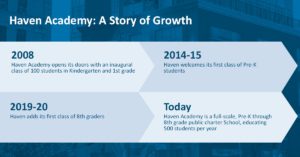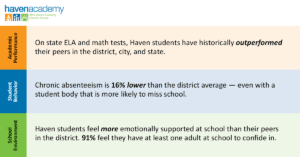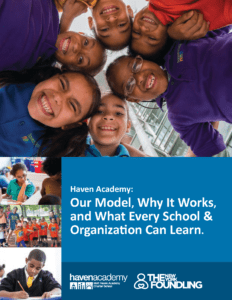Why Haven Academy Works: Documenting our Model
Young people in the foster care system have historically been failed by public schools – in New York, studies show that 1 in 5 kids that have foster care involvement in high school do not graduate, and 80% are not proficient in reading or math. At The Foundling, our education programs continually provide targeted support to help students beat these odds.
When we opened Mott Haven Academy Charter School – a school dedicated exclusively to this work – in 2008, we took on a mission no one had ever attempted before. Located in Mott Haven, one of the lowest-income neighborhoods in the nation, the school was explicitly designed for families in the child welfare system and the surrounding South Bronx community – aiming to remove the barriers to academic success that these children often experience.
As the first school in the nation specifically targeting the child welfare population, we were tasked with building a first-of-its-kind model from the ground up. And over the past 14 years, we have achieved remarkable growth and success. Haven Academy has grown from two classrooms into a full-scale Pre-K – 8th grade charter school, educating 500 students per year. We have instituted a trauma-informed approach that supports children and families both in the classroom and at home, created a social-emotional curriculum that teaches life skills, and have seen our students academically outperform other public schools on the district, city, and state levels.
It’s now time to share what we’ve learned. Last year, we conducted an in-depth research project – including interviews with staff and experts, reviews of Haven documents and materials, analysis of Haven data and data from other schools and government sources – to codify what makes Haven Academy work and how other schools and organizations can apply this model to their own communities.
Through this research, we’ve determined a number of data points, defined key characteristics, and documented how to replicate the model in additional communities.
Want to learn more? Download the full report here. Please contact development@havenacademy.org with any questions.




